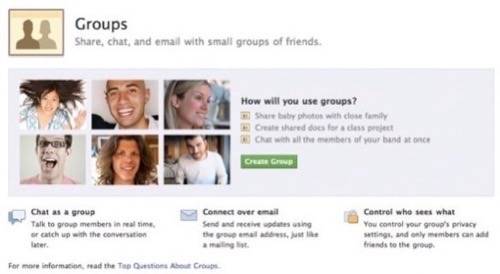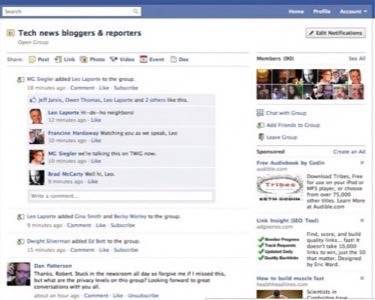People use Facebook a lot already, but the addition of the new Groups feature today will lead them to use it even more – and in different ways.

Facebook’s addition of a far more sophisticated Groups feature than was previously available will increase the time users spend on the site, the number of different ways they use Facebook and the importance of the already very important social network in the lives of those who use it. There are three thematic reasons why this is true: the new feature offers an improved signal-to-noise ratio, increased context for communication and a big improvement in user privacy, thanks to respect for the contextual integrity of conversations. The new feature runs some risk of being too complicated, though.

Signal to Noise
The creation of groups in any set of subscriptions, and that’s what your Facebook social graph is thanks to the News Feed, is a key way to offer users an option to change the signal to noise ratio of what they are reading moment-by-moment.
Users will continue to spend some time in the bulk Live Feed, seeing the most recent updates from everyone they have added as a friend. They will spend some time in the News Feed, seeing general interest updates from the people they have interacted with the most. And now they will spend some time in their Groups pages, where they know what to expect and where there is a social price paid for posting “off topic” content.
Focused conversations and collaboration in Groups will differ substantially from the old Facebook experience of undifferentiated broadcast. People will start using Facebook for new things – planning events, for example. It’s not just a social network anymore. Now it’s also a newsgroup, a planning tool and more.
Note that this is very different from the creation of Lists on Twitter. That organizes all statements shared by particular users grouped by a topic, but not necessarily only discussing that topic. The signal to noise ratio will be far superior on Facebook, but the discovery of serendipitous content relevant only because of who it was shared by – that will be better on Twitter, or on the Facebook lists that the company says only 5% of users took the time to create. There are some things that Twitter lists will still be better at doing than Facebook Groups.

Context
Could Groups Prove Malcom Gladwell Wrong?
Facebook and Twitter don’t have the power to change the world, says notable author Malcolm Gladwell, whose book “The Tipping Point” detailed how little things can make a big difference. He made this controversial, counter-intuitive argument via an article published in The New Yorker titled “Small Change: Why the Revolution Will Not be Twittered.”
ReadWriteWeb’s Sarah Perez summarized Gladwell’s argument here last week. The gist of it was that social networks lead to weak ties between people and weak ties don’t support taking the kinds of high-risk actions that big social change requires. That argument makes for a great debate, but consider the subsequent addition of Facebook Groups as a collaboration tool. It goes beyond the weak ties and offers solid, but social, functionality. Could Groups be Facebook’s most effective social change tool yet? It’s easy to focus on the promotional implications of social media, but what about increased organizational capacity thanks to tools like this?
A message posted to Facebook in general has only your friendship as context, and as Mark Zuckerberg said today – there’s no clear definition of what it means to be friends with someone on Facebook.
In the new Groups, messages will be written and read with several other sources of context in mind: the topic of the group, who invited a user to the group and related content in the form of shared editable documents and group chats.
A simple example: people who do work in complicated fields will now be able to post more high-context content to topical Groups than they may have felt comfortable sharing in their bulk News Feed made up of non-specialist friends and family. All the sudden, Facebook is a place to have deep topical conversations, not just lowest-common-denominator bulk public conversations. That’s a dramatic shift.
Privacy
We, and others, have been saying for 18 months that a more contemporary understanding of privacy would lead Facebook not just to respect the public/private wishes of users, but also to make it easy for the contextual integrity of communication to be respected. No photos from Friday night at the bar being shown in Church, and no audio tape of your prayers at Church being played for laughs from your friends at the bar again later. Yet that’s what Facebook has pushed people towards – all content being publicly visible and shared with all people, regardless of the context. Until today.
Zuckerberg spoke to this concern extensively today. The groups feature, at least in theory, will let you talk with friends about what’s relevant to the groups they belong to, and not about the things that aren’t relevant to them. That’s a good privacy move, but it’s also something Zuckerberg rightly says will encourage people to post more content.
The new feature does add another layer of complication to the whole Facebook experience.
“The groups work sounded promising, if they can offer something that satisfies the same needs as the little mailing lists that people either formally or informally create now,” says social network data analyst Pete Warden.
“I’m still worried that they’re taking the same approach to privacy that Microsoft takes to security. Their space-shuttle control panel approach is like having lots of noisy popups, people are confused and learn to ignore them. Far better if you can have a really simple story. Even with something as simple as open/closed for groups, it’s still too much for most people. Look at the whole ‘journolist’ scandal – participants obviously weren’t thinking through the fact that their messages were ending up in hundreds of people’s inboxes. Most people don’t have developed the ‘street-smarts’ to navigate even comparatively simple privacy models. I still regularly reply to Twitter DMs on my phone, and forget to add ‘d’ to the start of the message, sending the reply to my whole world.”
I’m not so sure. I think people will be able to handle these changes to Facebook. The interface may require a little more work, but it’s pretty good so far. I think people will find it useful, as a sub-stream of their bulk News Feed. I think they will find the signal-to-noise, context and privacy gains compelling enough that it will lead people to use Facebook more, and in new ways.















